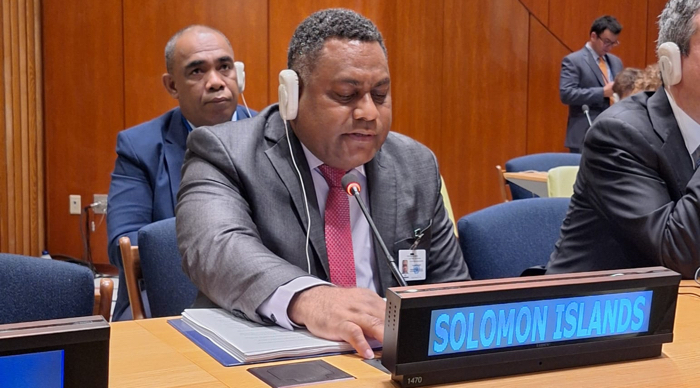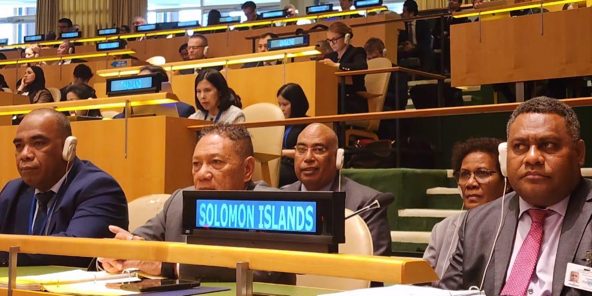SOLOMON Islands has called for urgent financial reforms to advance the 2030 Agenda for Sustainable Development and achieve the Sustainable Development Goals (SDGs).
The decisive stance was taken at the UN Summit of the Future in New York.
This was Solomon Islands delegation to the 79th session of the United Nations General Assembly (UNGA) joined the UN membership for the opening of the Summit of Future at the UN Headquarters in New York on Sunday morning, 22 September 2024.
Solomon Islands Government Head of delegation, Minister of Foreign Affairs & External Trade, Hon. Peter Shanel Agovaka and the Minister of National Planning and Development Coordination Hon. Rexon Ramofafia were present for the adoption of the Pact of the Future.
The Pact of the Future has been under intense negotiation by diplomats at the UN for the past 18 months.
It presents an action oriented and ambitious guide to turbocharge action on implementation of the SDG goals and offer pathways to reinvigorate the UN system to be responsive to current realities.
Minister Ramofafia delivered an intervention in the first panel discussions on Sunday. He called for urgent reforms to the international financial system, emphasizing the need for immediate action on debt relief and restructuring for developing nations like Solomon Islands.
The Minister highlighted the vulnerabilities in the current global financial architecture, which he warned are obstructing efforts to achieve equitable economic growth and sustainable development.

Speaking at the Summit of the Future during the Interactive Dialogue 1: Transforming Global Governance and Turbocharging the Implementation of the 2030 Agenda for Sustainable Development, Minister Ramofafia said the international financial architecture has several vulnerabilities and inequalities that can undermine financial stability and equitable economic growth.
“These include financial imbalances between countries with large current accounts and those like my own with persistent deficits, debt vulnerability, and the inadequate integration of climate change into the global financial system.
“These, among other factors, highlight the urgent need for reforming the international financial architecture,” Hon. Ramofafia stressed.
He pointed out that debt relief and restructure is pertinent and urgent.
The Minister emphasized the importance of extending and improving the initiatives like the Debt Service Suspension Initiative (DSSI) and the Common Framework for Debt Treatments to provide more comprehensive debt relief.
“Bring forward Innovative Debt Relief Solutions such as debt for Sustainable Development Goals (SDGs) swaps,” he said.
Minister Ramofafia also highlighted the $4 trillion annual funding gap that stands in the way of achieving the SDGs, calling for strengthened SDG-Linked Financial Instruments and urging global institutions such as the World Bank and IMF to play a larger role by providing highly concessional financing and risk mitigation mechanisms.
“The current financial flows are insufficient to meet the estimated funding needs for the SDGs. The World Bank and IMF must incentivize SDG-related investments to help close this gap,” he urged.
In closing, Minister Ramofafia called for increased representation of developing countries within international financial institutions and a more robust dialogue between the UN Secretary General and these institutions to ensure better financial flows for SDG implementation.
The Summit of the Future is a key focus at this year’s UN General Assembly high level week. During the two days of its convening, world leaders will contribute to their discussions on the Pact, in the plenary in in thematic panel discussions.
The 2030 Agenda for Sustainable Development is a global plan adopted by the United Nations to achieve 17 SDGs that address social, economic, and environmental challenges, aiming to end poverty, protect the planet, and ensure prosperity for all by 2030.
– MNPDC Press









